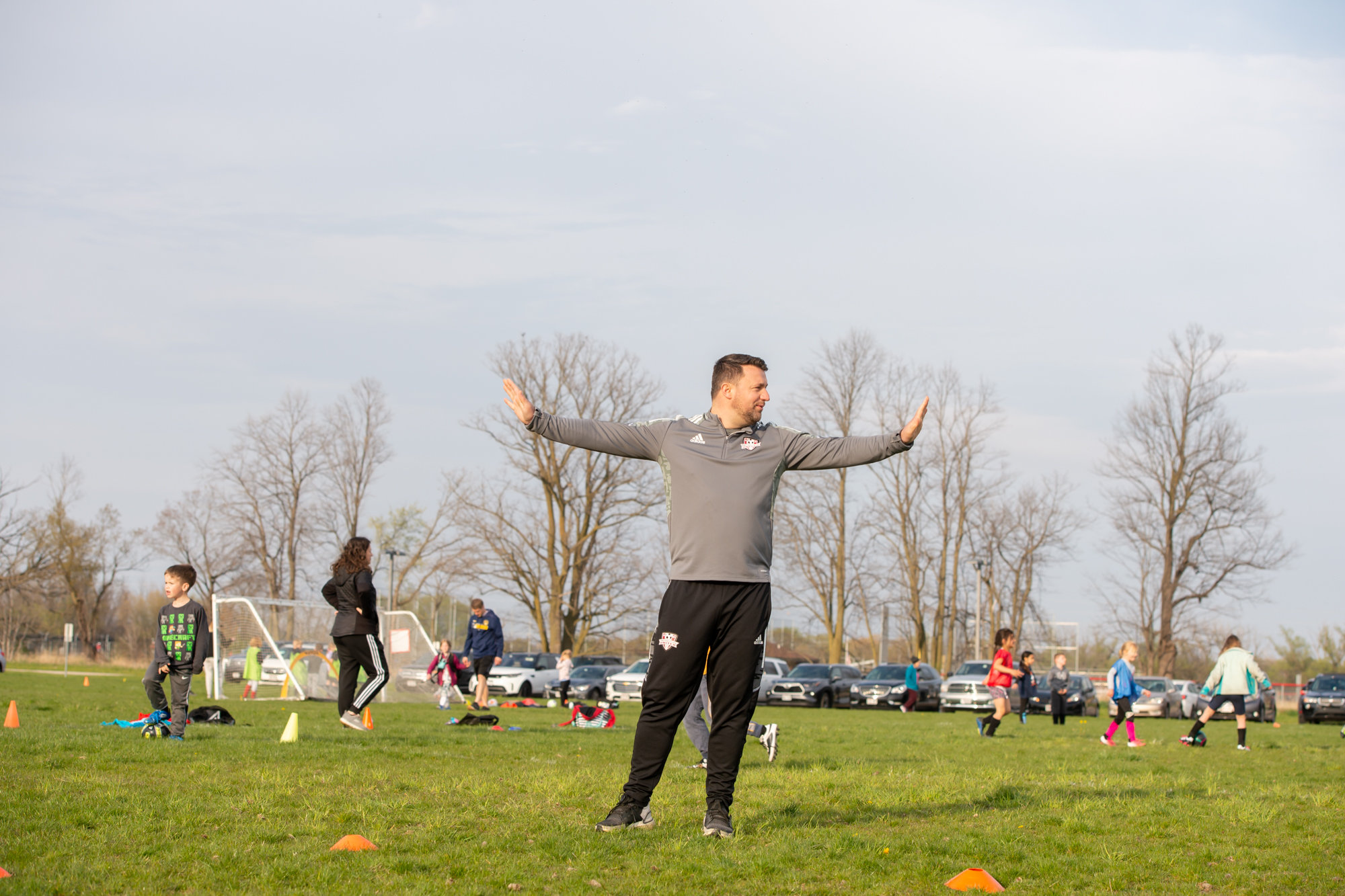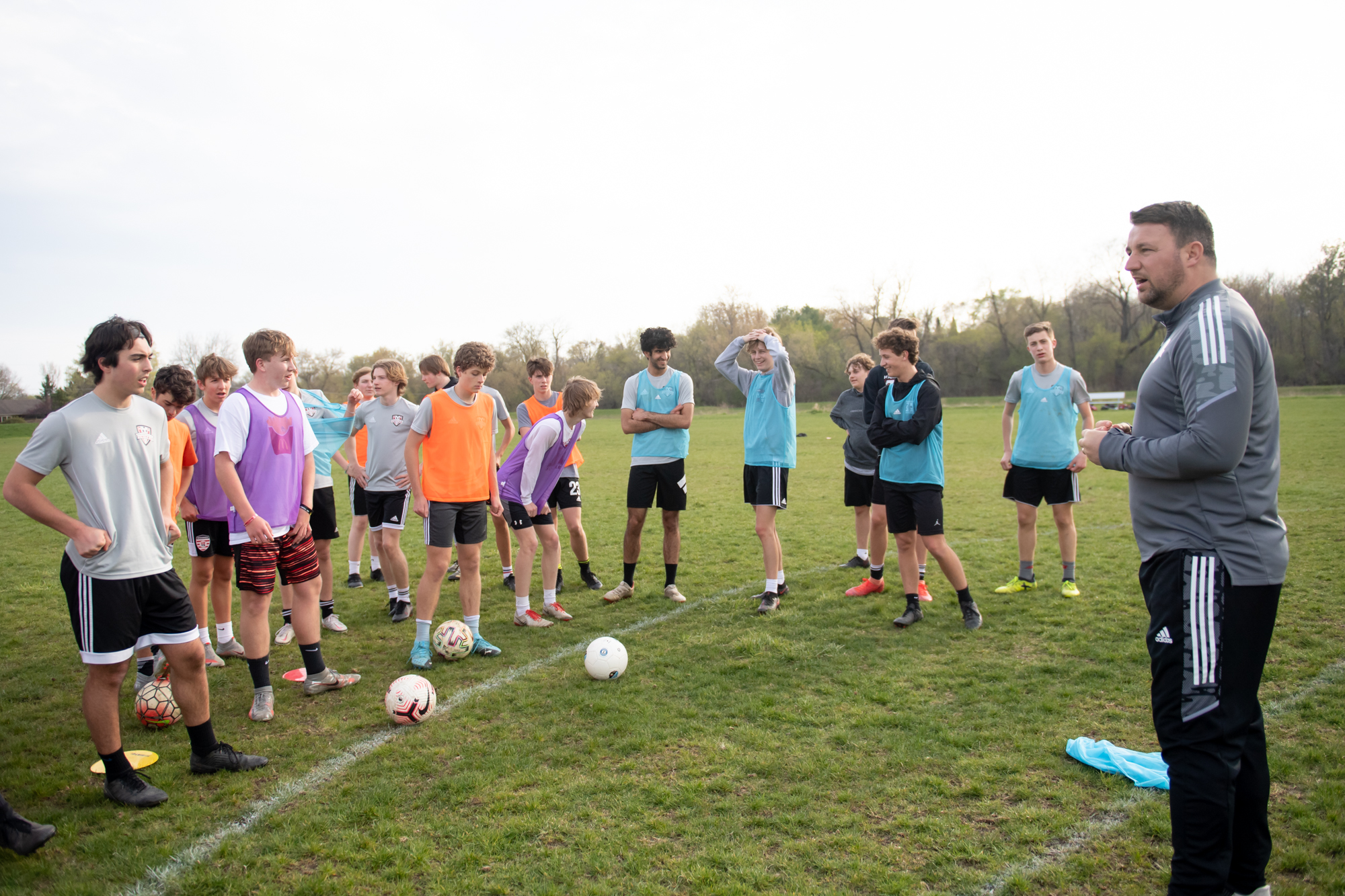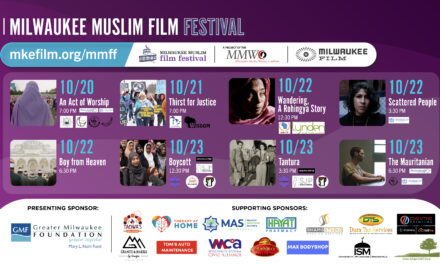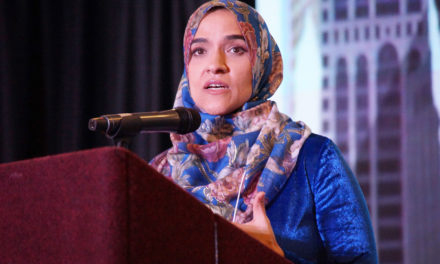Pewaukee Sussex United Director of Coaching Lati Ziba speaks to the U17 team as it prepares for competition.
When Director of Coaching Lati Ziba stood before parents at a Pewaukee Sussex United Soccer Club member meeting, he explained a philosophy that grew out of his unique life experience.
“‘Kids’ passion will get them to show up,’” Erin Gudeyon of Pewaukee, whose two young daughters are in the program, recalled him saying. “‘Skills will get them in. It is their character that will make them stand outs.’
“When I heard that, I wanted in and I wanted my kids in,” said Gudeyon, who felt so strongly about the approach she applied to work at the club and is now its director of operations. “He is doing things no other soccer clubs are even talking about doing.
“His ‘Player First’ approach means our whole club is focused on each individual player’s success rather than on the club’s success. It is discussed in every staff meeting,” she said. “He is all about building character in these kids.
“As parents, we have so many options of extracurricular activities for our kids. If it is just something for your kids to do, it is probably not worth it. If it is going to shape them and their future, it definitely is.”
In a Zoom interview this week, at the start of the Spring soccer season, Sherijat Lati Ziba, 35, shared his innovative approach to player development and coaching, explaining how it grew out of his life experiences and his Muslim faith.
Developing a unique soccer program
Ziba sat at his desk in a bright, white office, where only white boards with lists and notes in black erasable marker adorned the walls. A few books on sat on his desk: The Culture Code: The Secrets of Highly Successful Groups, Good to Great and Extreme Ownership: How U.S. Navy Seals Lead and Win.


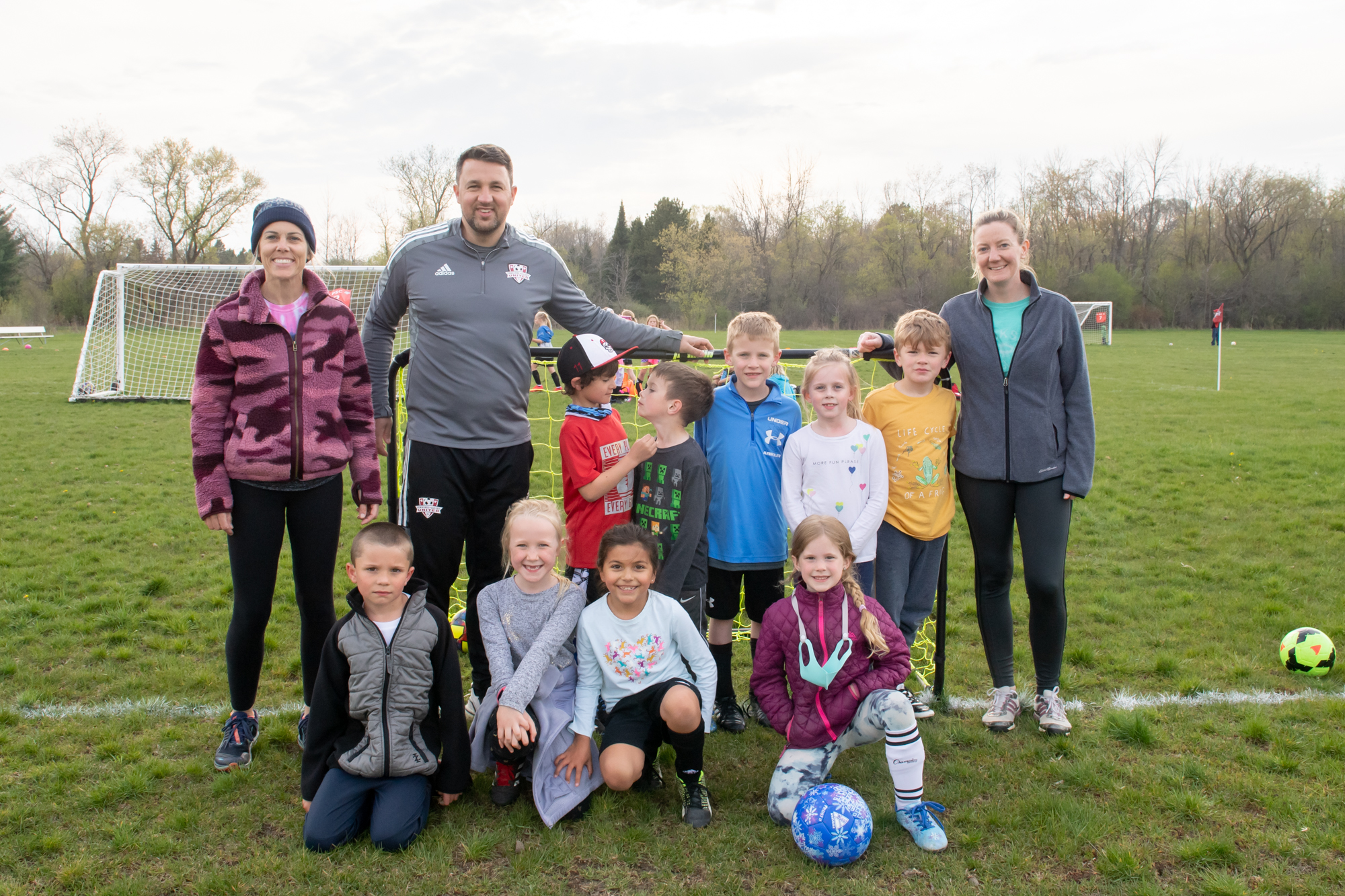
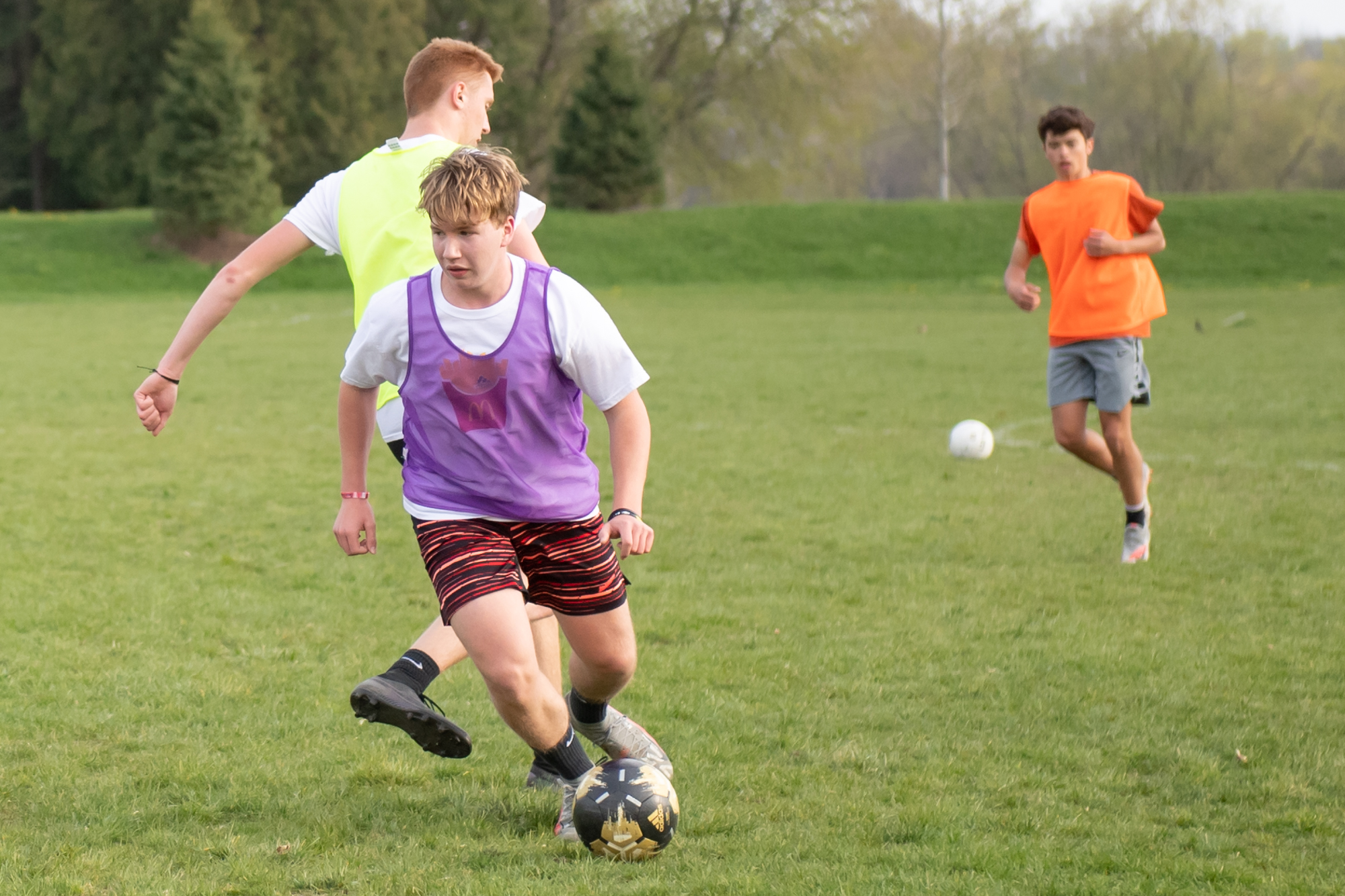
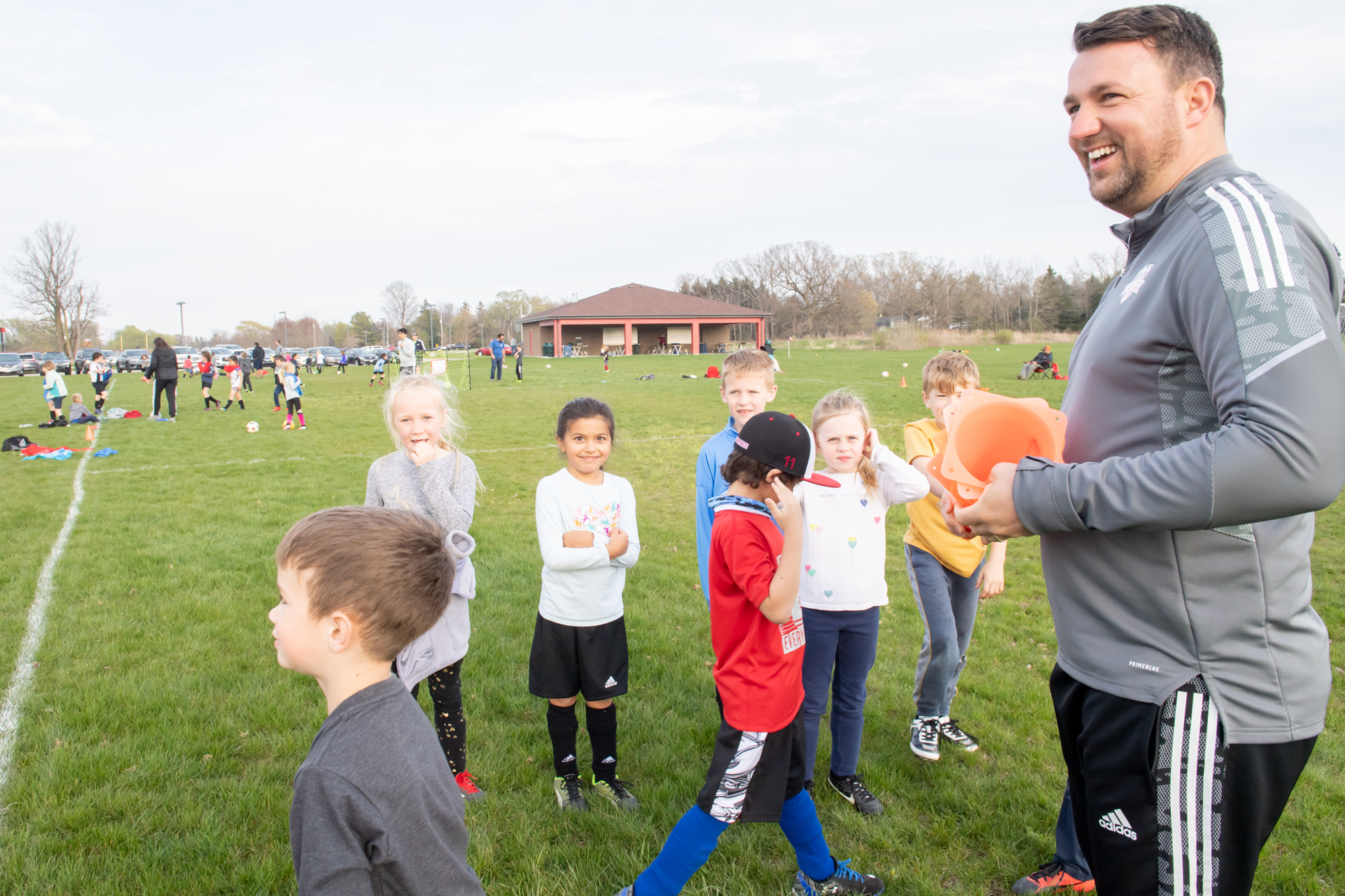
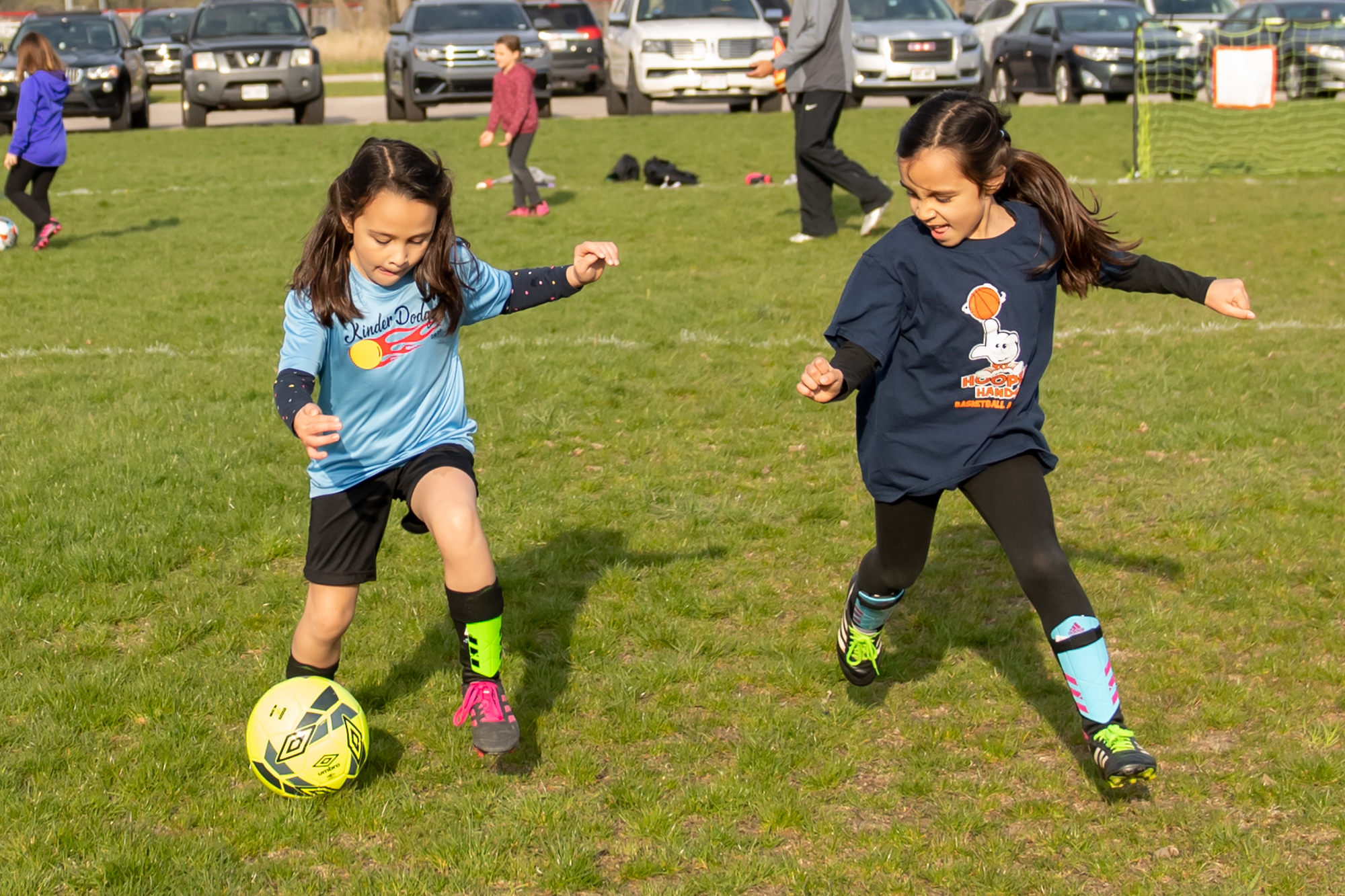
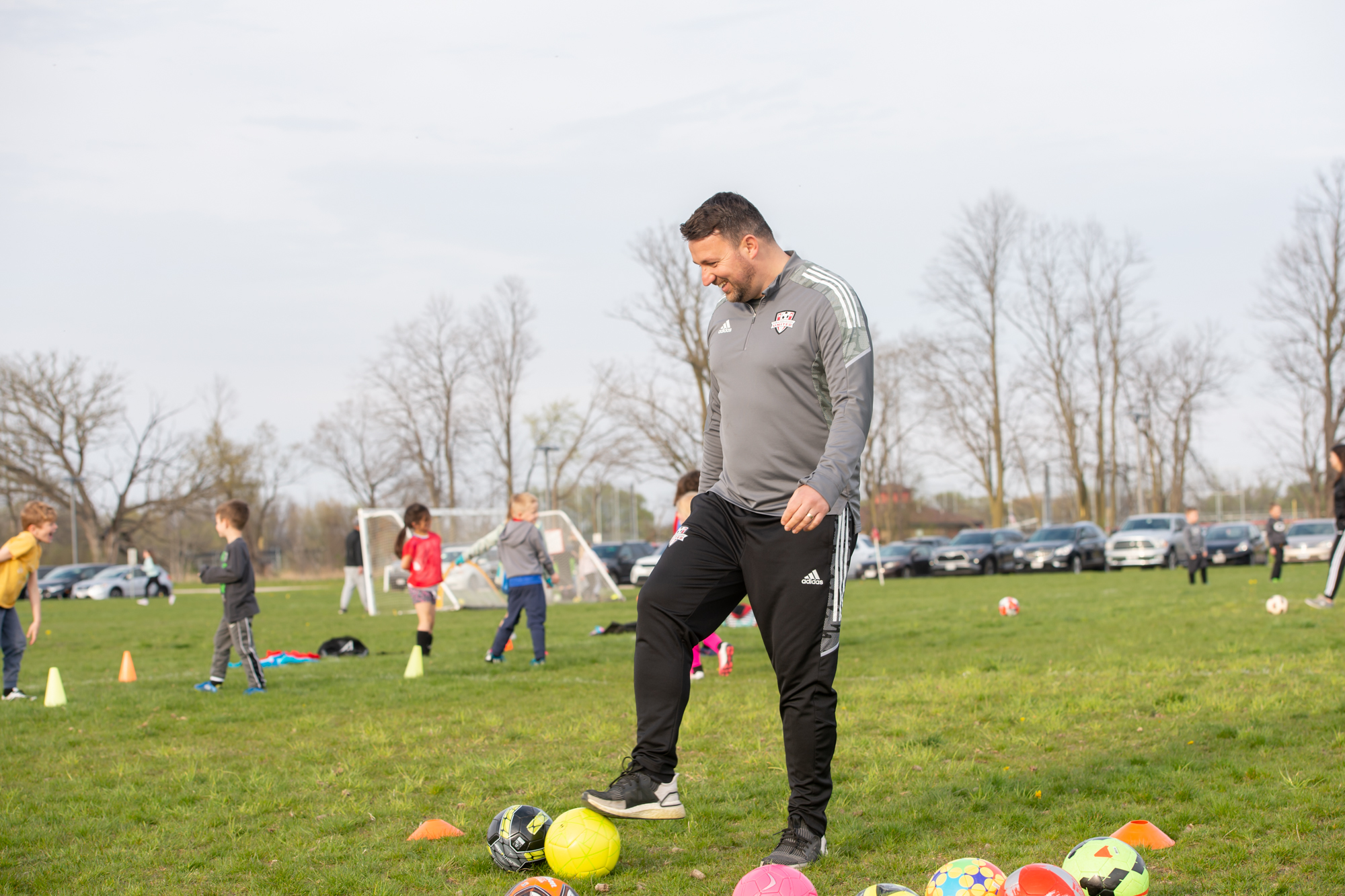

He pointed to a white board behind him where he had listed his agenda for the day. “I have a quote here that says, ‘Find your motivation or let your motivation find you.’ I made it up.”
It was inspired by his experience with his son, Rijan, now 3 years old. When Rijan was a baby and would cry in the middle of the night, Ziba got up and gave him a bottle, no questions asked. “I did it because I have to, because that’s my son. That is an example of the motivation finding me.
“But I wasn’t always waking up for morning prayer. So, I changed the way I thought about it. I don’t want my motivation to find me; I want to find my motivation,” he explained.
“It’s like a picture I saw of a guy on a bicycle. He is pedaling as fast as he can up a hill because a bear is chasing him. When I saw the picture, I thought what if I can do that hard work without being chased by a bear.”
Ziba has applied the same out-of-the-box thinking to how to best create a soccer program. He wants to tap into players’ intrinsic motivation, offer the experiences that will help them succeed and provide the challenges that push them to rise to the occasion, he said.
The result is a unique program with three different levels of play that is coupled with three different ways to learn.
“We have soccer for kids from 3 to 18 years old,” he said. “The way I like to say it is, regardless of age or level of play, we have a place for you. The idea from the beginning was that we want to be a club for all.”
The levels include Recreational, where the aim is to make friends and have fun. The Select Level is more competitive and Premier is for those who aspire to play varsity soccer in high school, college soccer and beyond.
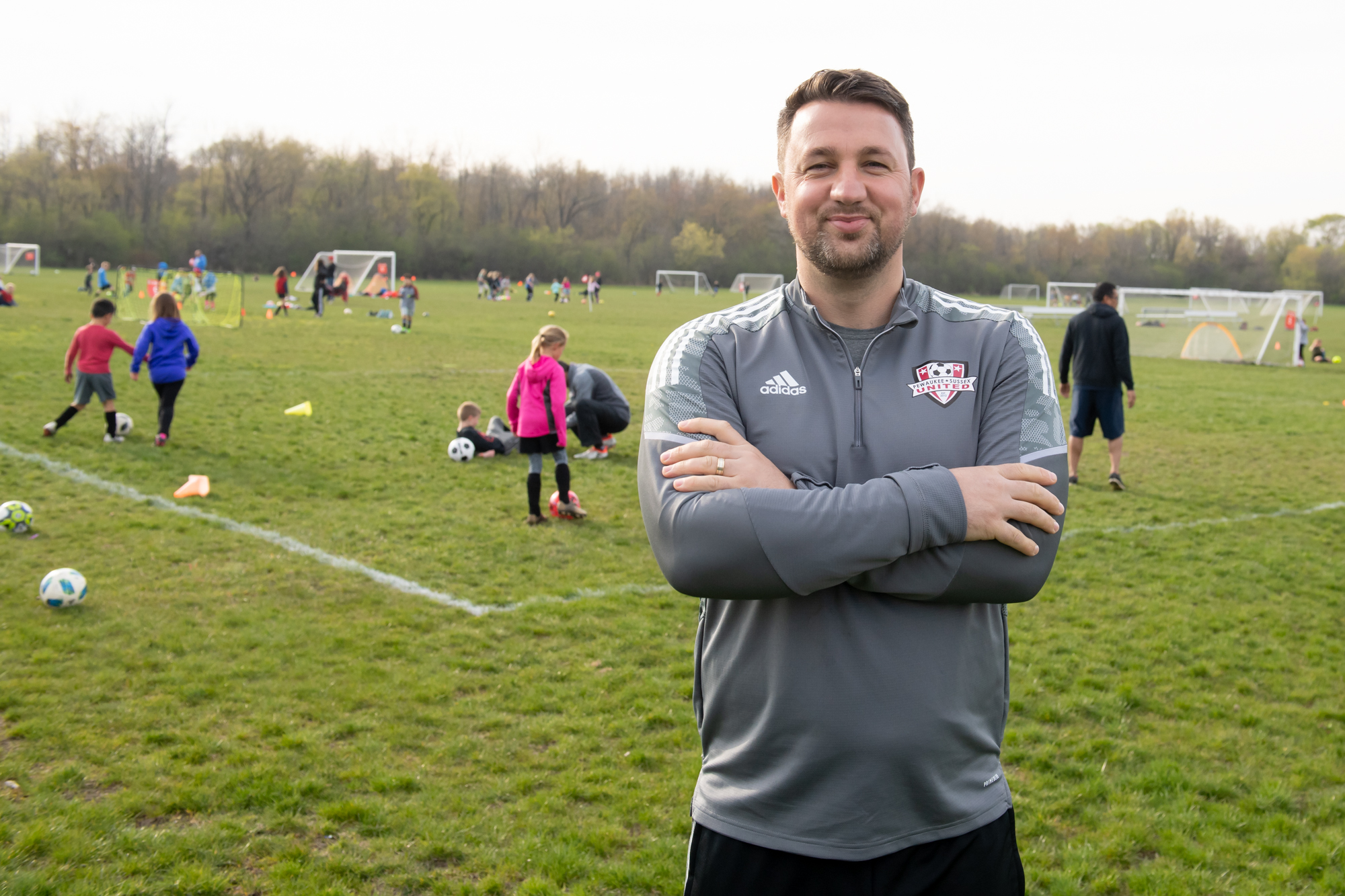
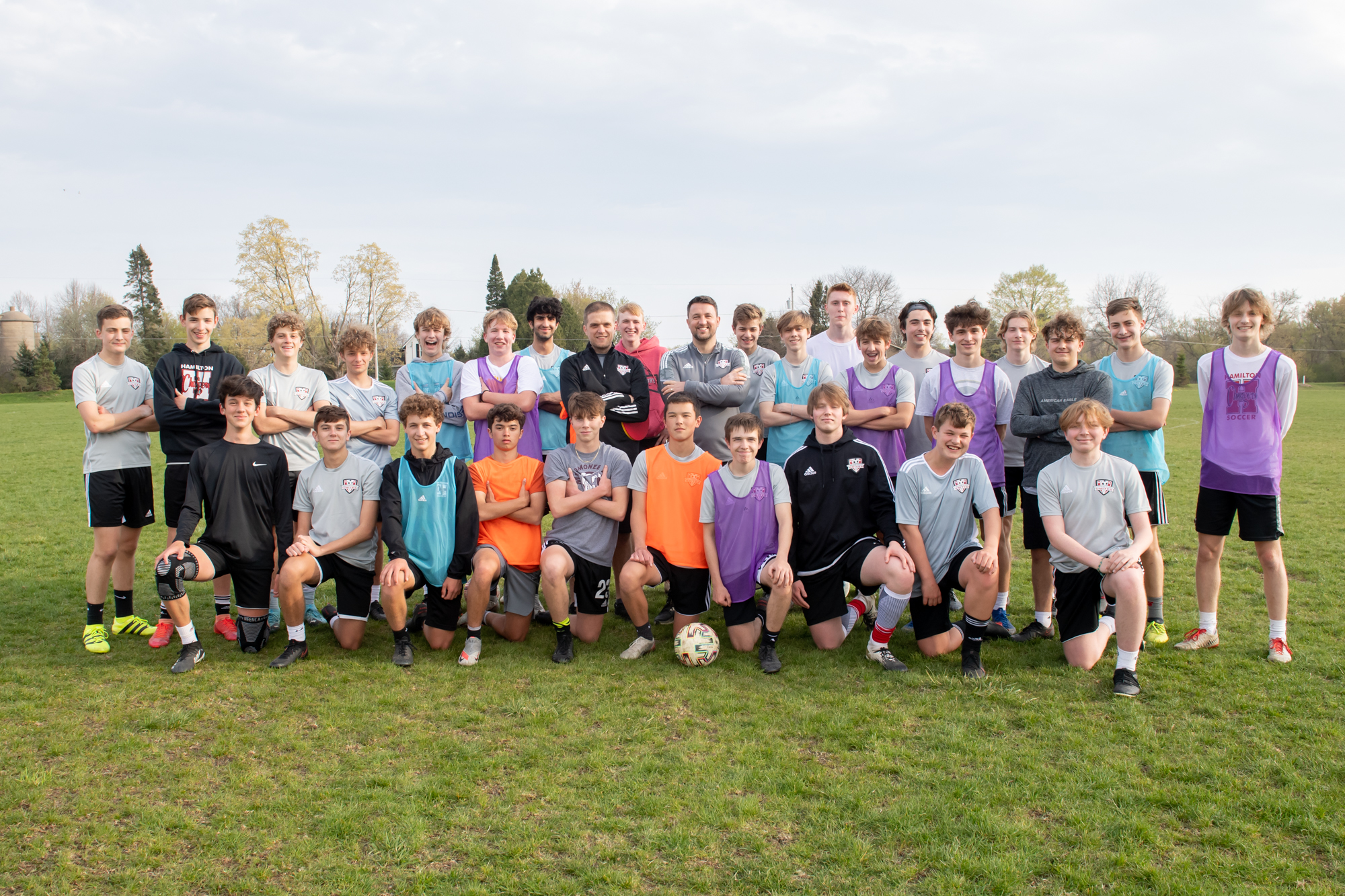
The three ways of learning include team training, a player excellence program, which is designed to help players improve their individual skills, and Friday night free play, which reminds Ziba of how he grew up playing street soccer. “I can’t imagine our program not offering all these elements that are so important in the growth of any child,” he said.
Like other clubs, Ziba’s program includes team training. Players benefit from learning to play with a team. But that is not the only way to learn, he said. In team play, the coach is focusing on the team as a whole and less time is spent on each player’s skills.
The second approach – the Player Excellence Program – is designed around the individual player and their needs. Players work in small groups and get to choose what they need or want to work on each night, he said. It is also a time when they can interact with other players and coaches from across the club.
Friday night free play is a chance to learn from the game itself, Ziba said. It is opened to all, free of charge, whether you are a member of the club or not. There are supervisors there but no one is coaching.
It grew out of Ziba’s experience as a child in Macedonia. He would follow his cousin, known in the community as “the best soccer player,” and join his pick-up games. “When I relate back to my own story, I see how many, many hours I put in playing street soccer.”
In line with his philosophy of inclusion, “we try not to let financing be an issue that stops someone from playing,” Ziba said. “Soccer should unite people, create many memories and long-lasting friendships. When I hear that somebody can’t afford it but wants to play, I know that feeling.”
Financial aid is available for players meeting the criteria. “I always say if someone needs it, they should talk to me. I will do my best to work something out.”
Another important component of the club’s approach is the individual development plan, Ziba said. “We sit down with a player and say, ‘Tell me about yourself. Where do you go to school? What are your dreams? Why do you like to play? Then we ask, how can we serve this player better? How can we create an environment where he or she can grow?”
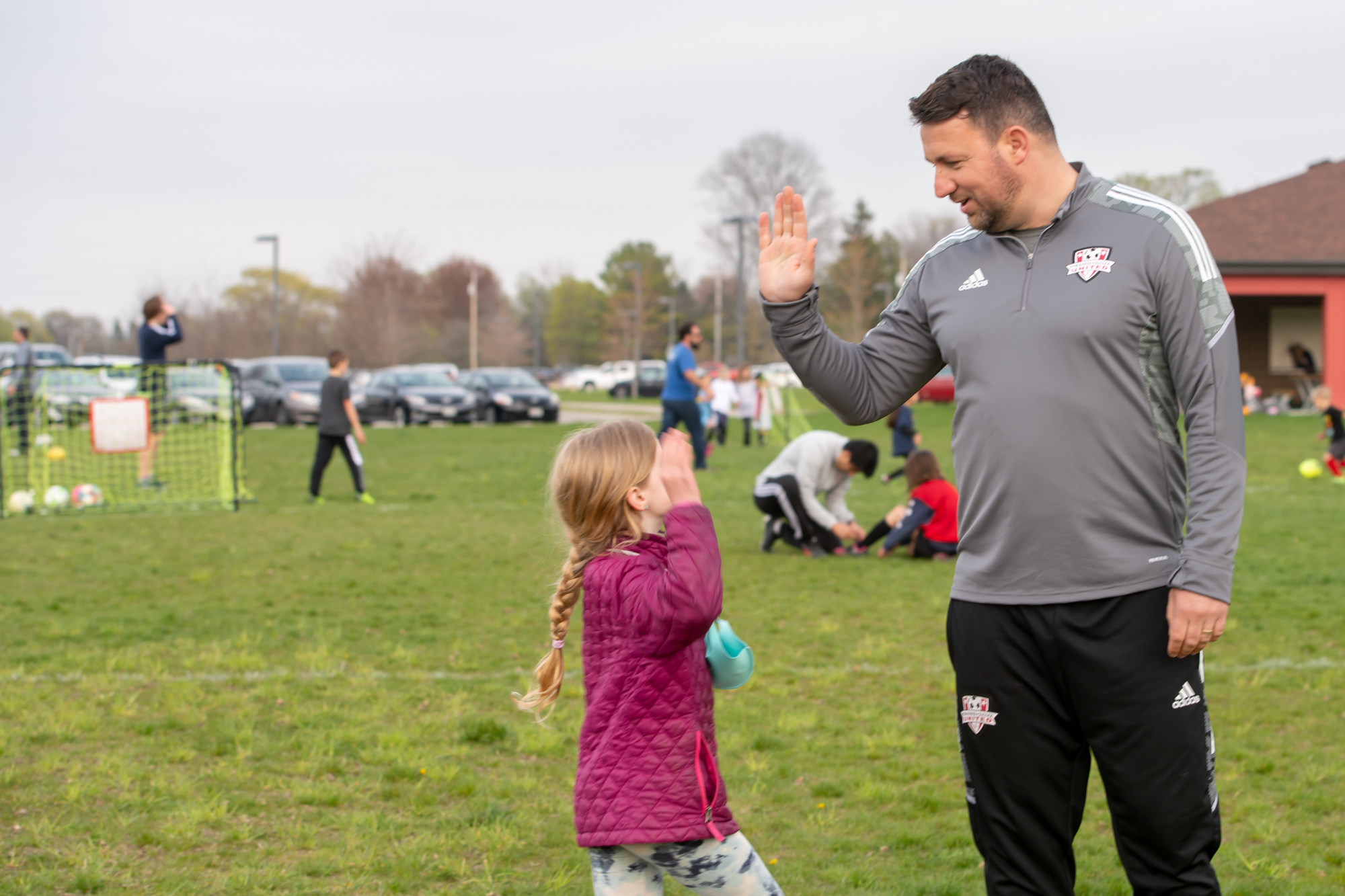

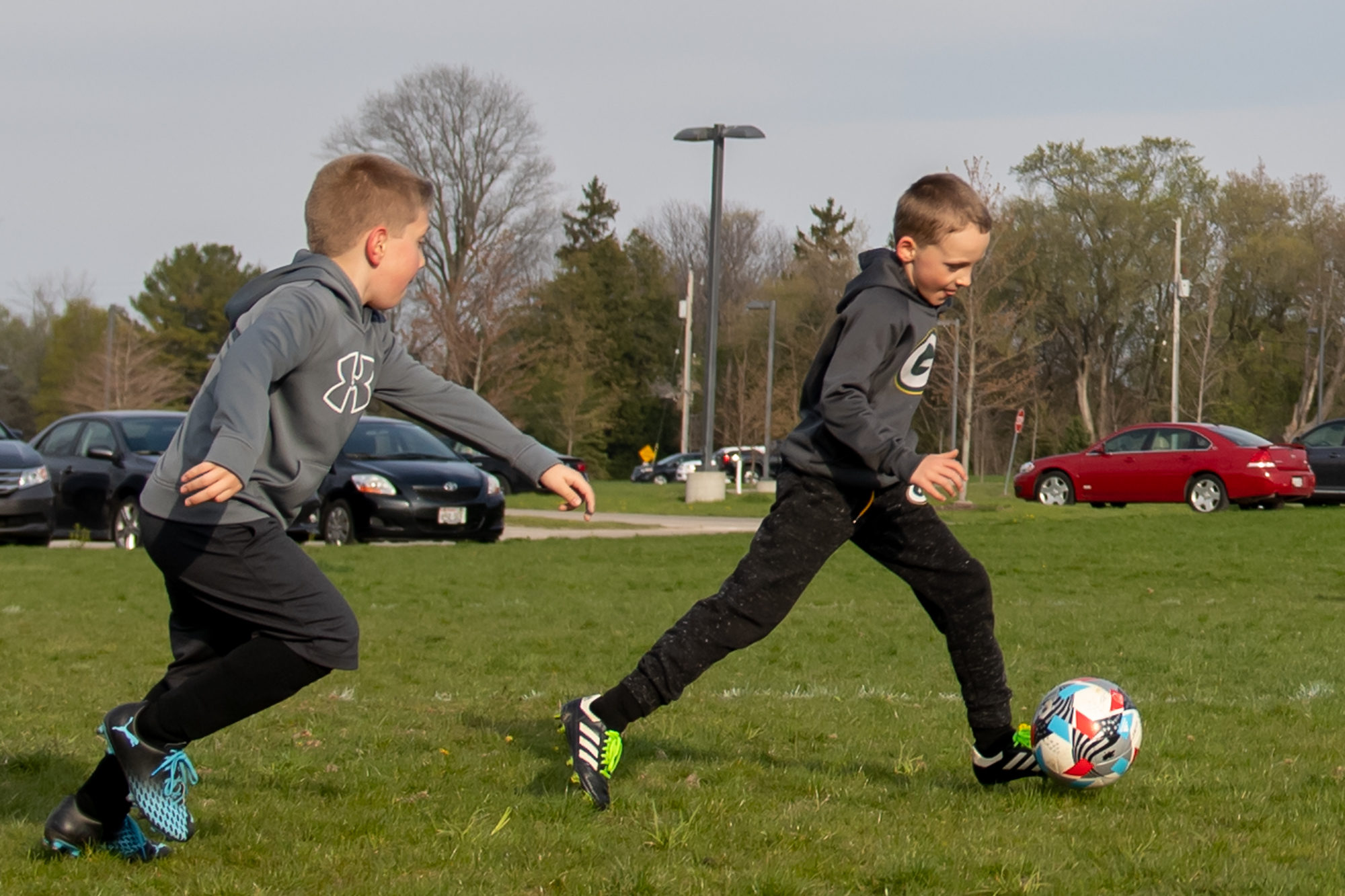
Soccer’s role in Ziba’s life
“I want to get youth involved in soccer because of what soccer has done for me,” Ziba said. “What soccer teaches you, soccer skills aside, is how to meet and interact with people, enjoy something you are doing and to create new experiences. Most of all, it teaches you to fall in love with the process of getting better at something and to believe if you work hard you can achieve something.”
Ziba grew up in an Albanian family in Macedonia. When he was 6 years old, his parents moved to the United States, taking their two oldest children and planning to send for Ziba and his sister. Although “they tried everything,” Ziba was not able to reunite with his parents for another 10 years.
He grew up bouncing between his grandparents’ and uncles’ homes, changing communities and schools. Through it all, soccer helped him build new friendships and begin a new life. It was the key to “fitting in,” he said.
“I just had a vision it was going to take me places,” he said. “I just stuck to that mentality, played so much and made new friends. I just played street soccer. I didn’t have anyone coming to the games, telling me if I was good or not.”
At 15, just when he had finally given up on reuniting with his parents, Ziba got a call that his visa came through. He came to the U.S., joining South Milwaukee High School as a sophomore.
He arrived in the spring without knowing English or having friends at the school. And the high school soccer season wouldn’t start until the next fall. It was a lonely six months.
When the season rolled around, “I started kicking the ball and became very popular. Everyone wanted me on their team and I got to know so many people. Through new friends, I picked up English pretty quickly.”
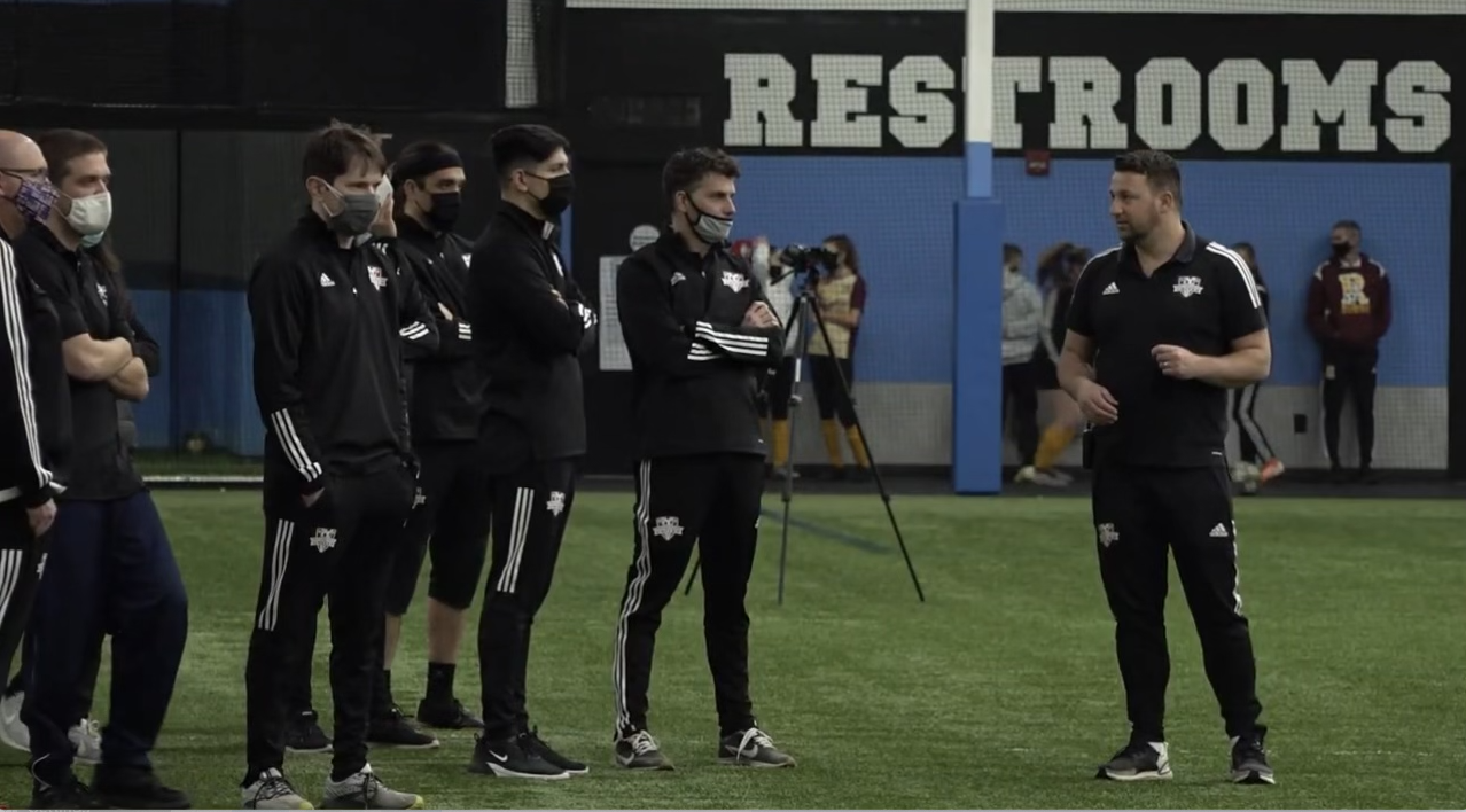
Ziba was recruited by Division 1 universities as a soccer player and was offered a full scholarship to the University of Wisconsin – Green Bay.
Soccer was also the connection for Ziba meeting his wife. He was playing in Chicago with a team called the Albanian Stars. He was in the car with the team manager when the manager’s daughter called because she was having car trouble. Ziba’s future wife who is an Albanian from Kosovo was in the car with her.
“It was fate,” his wife Kaltrine said in a telephone interview. “He had a special energy about him and you could tell right away that he is an incredibly nice guy,” she said. But, since she didn’t know him, she asked about him. “Everyone in the community knew him and they all said he is the nicest guy.
“Now that I have known him for 10 years, I can say he has the highest set of morals you’ll ever find. He is so kind, patient and always wanting to help. He never expects anything in return.
“He is a very present father with our two children, Elijona and Rijan. He never pushes soccer on them, but Elijona, who is 5, is starting to love it. She is so proud that her dad is the coach.”
Soccer has played a key role in Ziba’s life for all but a few years. After graduating from college, he tried out for professional soccer in Sweden. It didn’t work out and when he returned to the U.S., he looked for a job. He found one selling insurance for Northwestern Mutual Insurance Company that kept him out of soccer for five years.
“But something kept telling me, no, don’t leave it,” Ziba said. He made a decision to get back in the game. After serving in several different coaching and program directing positions, he had the opportunity to create the program at Pewaukee Sussex United he would have wanted himself, he said.
Ziba sees it as a program based on his faith. “I always had a strong belief in God and our religion even when I was a kid.” It kept him on the straight path because he knew God saw what he did, he said.
Islam’s five pillars of faith taught him lessons that apply to soccer: to believe, work hard, make sacrifices and stay on the path to reach success. Then, when you do, give back to the community. He said he is “thankful for the success he has achieved.
“It’s my time to give back to the generations to come,” he said.
“I’d like to see more people from our community be involved in sports. I’d like to see more kids doing it. I believe this is one way I can give back. I know soccer and I know what it can do for people.”
